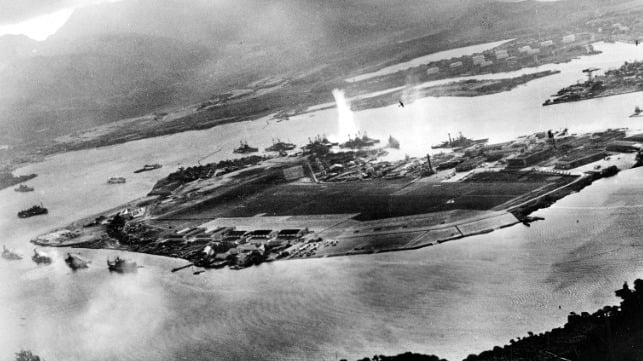U.S. Navy Commemorates 79th Anniversary of Pearl Harbor

Monday, December 7 marks the 79th anniversary of the attack on Pearl Harbor, the "date that will live in infamy." More than 2,400 American servicemen and civilians were killed in the Japanese raid on the island of Oahu - the majority of them Navy Sailors and Marines.
This year, the annual remembrance ceremony at the Pearl Harbor National Memorial in Hawaii was held virtually: many of the surviving veterans of the raid are nearing the age of 100, and they face a heightened risk from COVID-19. Normally, dozens of WWII veterans would travel to the memorial to participate in the commemoration; instead, for 2020, the National Parks Service and the U.S. Navy held a virtual event.
"First and foremost I would like to offer my sincere regrets . . . . to the Pearl Harbor survivors and World War II veterans who could not join us here today," said Rear Adm. Robert Chadwick II, commander of Navy Region Hawaii, in a virtual address. "While you are not here physically, I can assure you that you are here in our hearts and our gratitude. Your lives and your examples of honor, courage and commitment will never be forgotten and will never cease to inspire us."
On December 7, 1941, 350 carrier-launched Japanese aircraft carried out a surprise raid on the naval base at Pearl Harbor. The attack sank or damaged eight battleships, three destroyers and three cruisers and destroyed nearly 190 American aircraft. Over 2,400 Americans lost their lives, including nearly 1,200 sailors and Marines who were aboard the ill-fated battleship USS Arizona.
No declaration of war or warning preceded the raid, prompting outrage and an immediate military response. The Japanese attack fell far short of impeding U.S. reach in the Pacific: Pearl Harbor's base infrastructure was left mostly intact, and the warships that sank were in shallow water, facilitating salvage and repairs to put them back in the fight. Crucially, none of Pacific Fleet's three aircraft carriers were in the harbor at the time of the strike, and American naval air power turned the tide of the war in the Pacific just six months later, destroying four Japanese fleet carriers at the Battle of Midway. However, the process of rolling back Japanese positions in the Pacific and securing victory would take another three years of hard fighting.
"Imperial Japanese forces thought they could break our will to fight and our capability to do so," said Navy Secretary Kenneth Braithwaite in a video address. "But they were wrong. Our Sailors and Marines rose up to fight back, from the flaming decks of USS Arizona to the victory aboard USS Missouri. They never stopped fighting . . . Never forget Pearl Harbor. Always remember those who went before us and let that drive your service, today and every day for you make all Americans proud and it is my honor to serve at your side."
